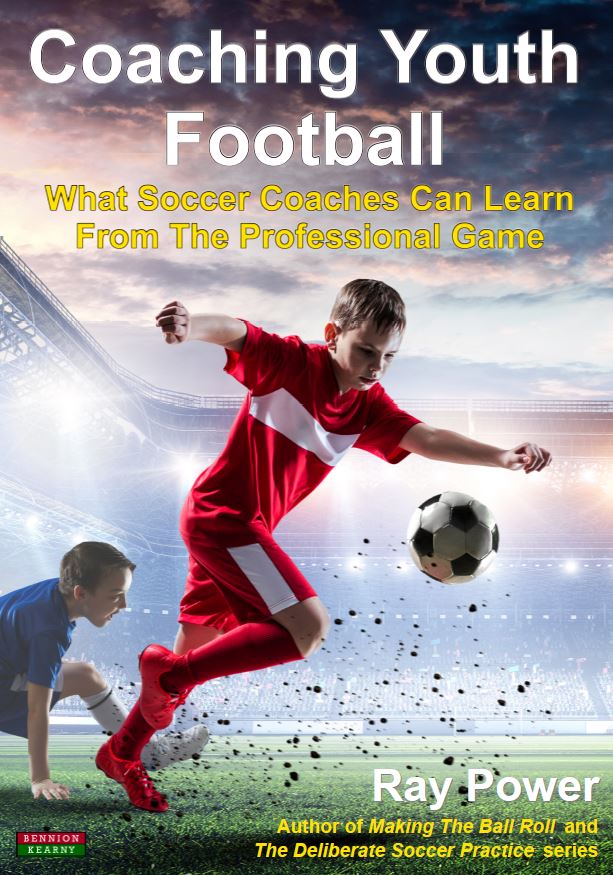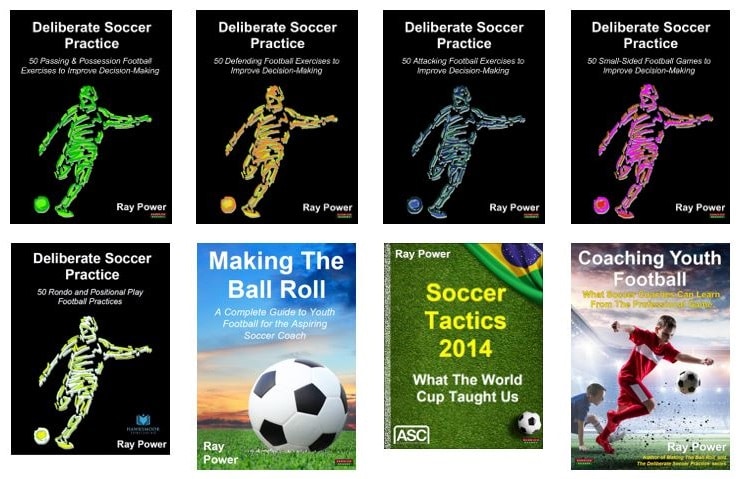The Introduction to Coaching Youth Football: What Soccer Coaches Can Learn From The Professional Game by Ray Power
Before you can coach others, first you must learn to coach yourself.
Johan Cruyff
In my early 20s, I made football coaching my professional aim in life. Even back then, I was absorbed in the game. I felt I knew everything – not in an arrogant way, but having played and watched and studied it all my life, I couldn’t possibly imagine what was out there that I had left to know. How wrong I was.
Football coaching is, of course, more than just being familiar with the game. It is about much, much more than that. A colleague once asked me, after the publication of Making the Ball Roll, whether this was everything I had to share. Is the content of the book the end? It was not. There is always new content out there – new angles, new takes, new research. This book, although with a different title, is very much a follow-up to Making the Ball Roll (and I’ll reference the first book a lot over the following chapters! Please bear with me!). There is masses of new material here (90%+), but there is also some material which is either reproduced or re-adapted from my first effort. Without doing this, important continuity would have fallen flat.
From thinking I knew all there was, to accepting that I will never, ever know everything, was an important watershed in my journey. Being open-minded to all avenues of knowledge and improvement should form the foundation of the work and development of any coach, at any level.
Anyone who stops learning is old, whether at twenty or eighty.
Henry Ford
Our Coaching Lens
I recently presented at a coaching event in Asia. I was asked to feedback to a national association about the performance of their Under-18 team, the morning after the game.
I have always had a problem with parachuting into another environment, telling coaches what I believe is ‘wrong’ then parachuting out again. It is too easy. When you go somewhere to find fault in something, you will find it pretty easily and pretty quickly. The feedback can lack context, a full understanding of what is happening behind the scenes, and, critically, people are biased. I was never afraid to receive feedback as a coach, but rarely did I appreciate somebody watching my teams train or play, and basing all their judgements on that alone.
So, as you can imagine, feeding back to the personnel above, in the presence of about 30 other football people, made me feel quite uneasy. It was while preparing this presentation that I first spoke about our coaching lens.
Whether we like it, or not, or whether we know it, or not, we see the game through our own thoughts, experiences, and preferences. So, had Pep Guardiola been presenting in my place, he may have watched the game and focused heavily on ball possession, for example. Jürgen Klopp may have focused on counter-pressing. Jose Mourinho on compactness, etc.
We will all have our respective lenses. We see the game the way we want to see it, and therefore coach it the way we are familiar with. This is 100% ok provided we are not just dismissing alternatives along the way.
This is probably a big reason why spectators or maybe parents around your team, complain when you require your team to play out from the back and express themselves in possession. Their experience of the game may be a different one from yours. It may even be quite old-fashioned. When they played, maybe it was all about physical dominance, direct play, or one particular formation. So when they see you encouraging short kick-outs, dribblers, or playing a certain system, they don’t like it as it doesn’t represent the game as they know and understand it. Maybe they believe that coaches should shout and narrate every kick of the ball, so do not understand a more subtle, composed approach. Opening our minds and allowing a widening of our lens is essential to progress.
Confirmation Bias
As you read through this book, I would ask you to be as aware of your own lens and your own biases as you can. I am certain that at least one thing in this book will challenge the way you coach or think about the game. Even if on first reading you disagree with something entirely, work hard not to reject it immediately. Allow the conflicting theories to have a ‘punch-up’ in your mind and see then if it changes or adds further layers to your view. If it doesn’t, then this is also acceptable. You have learned by considering and then rejecting information. Even if it does not change how you operate, the reinforcement makes your work stronger.
Those of you who are keen users of social media will note the many debates that surround coaching – opposed practice versus unopposed practice, blocked practice versus game-related, etc. There are often two camps – those who would argue to the death for one view or the other. Ironically, however, to have a balanced opinion and to learn, we need both these people. We need that polarised conflict to help us come to our own conclusions.
Often we search for the evidence that only backs up our opinion – this is our confirmation bias. We highlight, agree with, and allow information that supports our opinion to grow and anchor in our minds, but immediately dismiss anything that does not fit into our lens. This does not allow us to grow as we might.
Discover your gift, develop your gift, and then give it away every day.
Don Meyer
The Professional Game
Children are not mini-adults.
Youth coaching mantra
Coaching youth football is very different from coaching the adult version of the game, and coaching amateur players is very different from coaching professionals. Training methods, the pressure put on players, and a ‘win-at-all-costs’ mentality is different. Indeed, quite often, what we see in professional environments will be completely inappropriate for young players. I subscribe wholeheartedly to the quote above – children are not mini-adults and should not be treated as such.
Throughout this book, we will nonetheless look at a lot of examples from the professional game, but apply them carefully to our youth environments. This includes well-known professional teams and coaches, the work of international football associations, and the academy game (for clarity, I use the term ‘academy’ to represent the youth section of professional clubs).
Your team will not be as tactically astute as Pep Guardiola’s, but maybe we can learn from his game model nonetheless. Your young attacker may not have a lot in common with Harry Kane or Antoine Griezmann at the moment, but maybe anecdotes from when they were teenage boys making their way through the game will have relevance to you and your players. There may be a sense of survivorship bias (focusing on those who ‘made it’ through one system and ignoring those who did not) throughout, but I do not believe we should ignore the journeys and work of those who have reached the top of their profession. If Richard Branson was to give a lecture on developing a successful business model, I would expect every entrepreneur to listen. Today, we have more access to the best coaches and the best players, so why wouldn’t we try to glean best practice from them?
It’s Your Game
Story-telling is a powerful learning tool. In any coach education course I took, there was always a saying that “You learn as much in the bar in the evening, as you do in the classroom.” Whilst arguable, the angle was that sharing experiences with others, and listening to theirs, gives you first-hand accounts of what has been successful or unsuccessful for actual coaches working in a similar environment to you, again promoting learning and broadening horizons.
Throughout the book, we will hear from coaches of all levels – ex-professional players, players who never played at elite level, and other experts in their field. We will also hear from part-time coaches who work with amateur, grassroots players, who simply have something they want to share – and they are certainly worth listening to. We will also hear from authors, academics, coach educators, and a referee!
Those familiar with Making the Ball Roll will remember the Real Coach Experience segments at the end of each chapter. Here, real coaches tell us about a snippet of their work, helping to bring the theory of the chapter to life. Due to the popularity of the segments, they have been expanded here. The majority of chapters have at least two ‘real coach experience’ segments, now called It’s Your Game, due to our link with the wonderful football website and resource, www.football4football.com. I have included their Twitter handles, and also the handles of others mentioned throughout the book.
On a personal note from me, I would like to thank all of those who contributed to the content of the following chapters. Your time, whether face-to-face, over the phone, email, or through various message services, is truly appreciated!
Enjoy the book, and you can always find me on Twitter (@power_ray).
* * * * *
Ray Power is one of the bestselling football authors in the world. With over a decade of experience working in football and education, coaching players from non-league to Premier League levels, and internationally, he is the author of Making the Ball Roll, and the Deliberate Soccer Practice series.
As a coach developer and educator, Ray has worked for, and consulted with, numerous national FAs, as well as governing bodies from other sports, including the NBA. He also works as a consultant – mentor – educator on a freelance basis, working with grassroots coaches all the way to professional teams.


